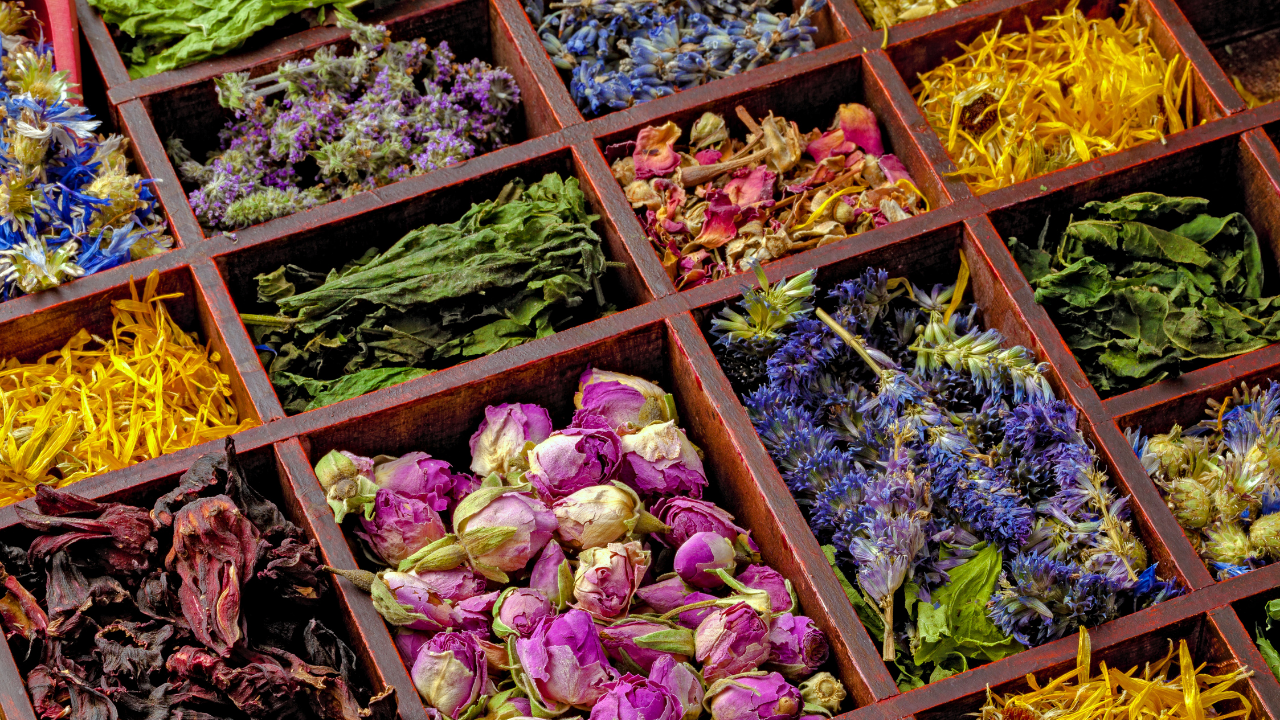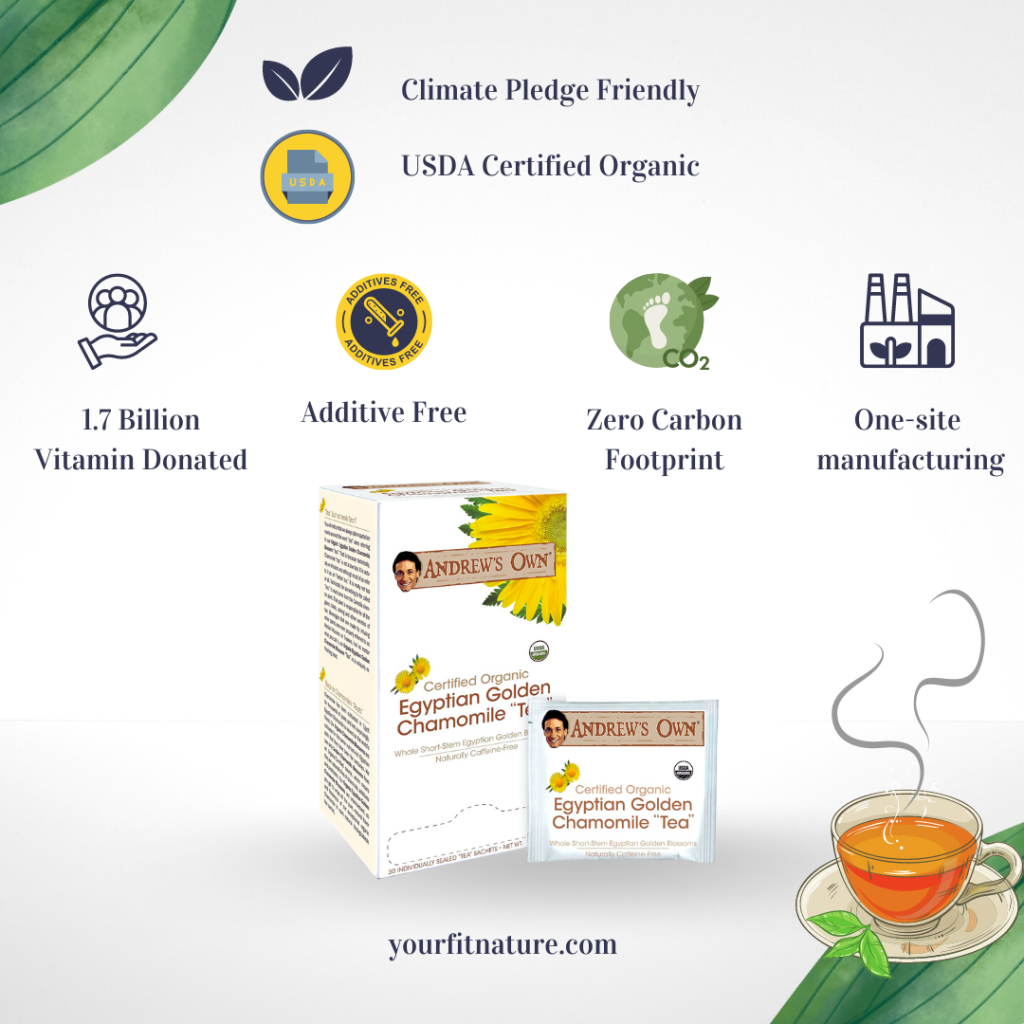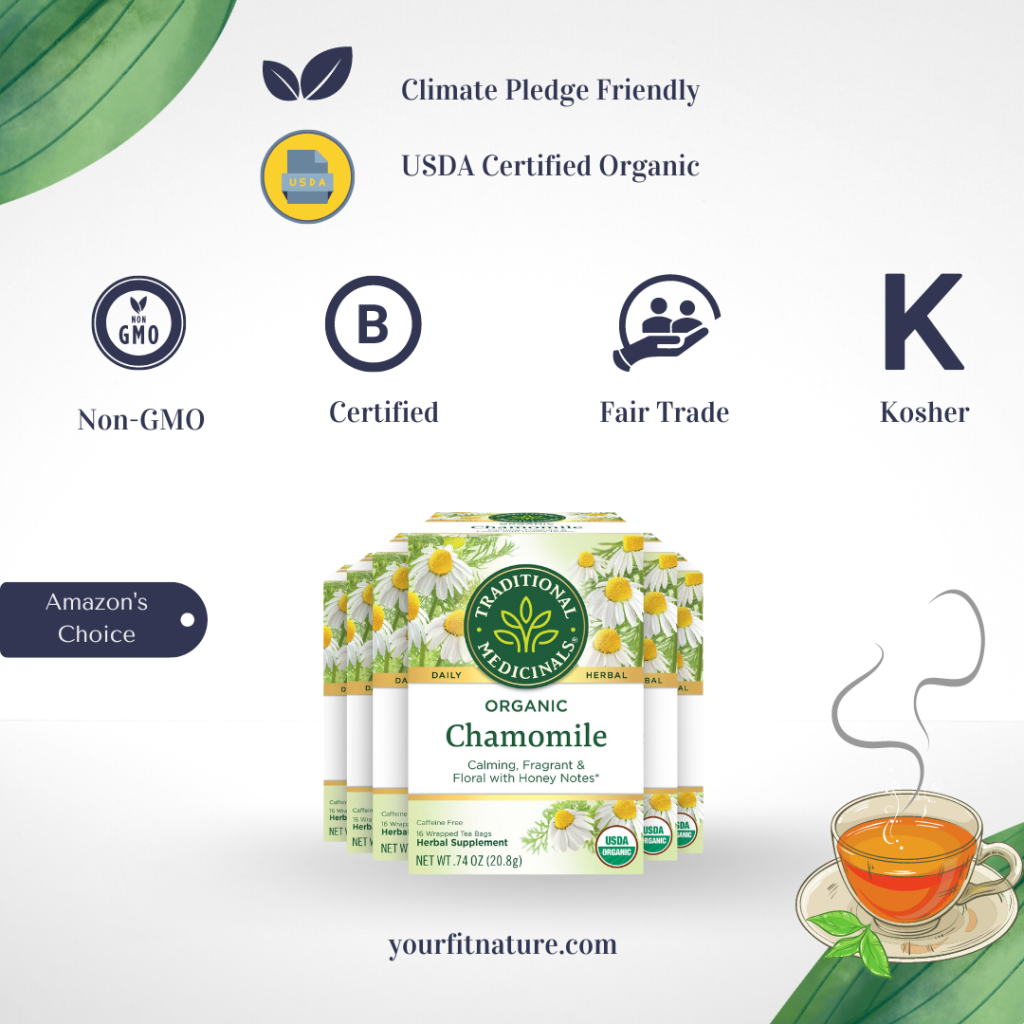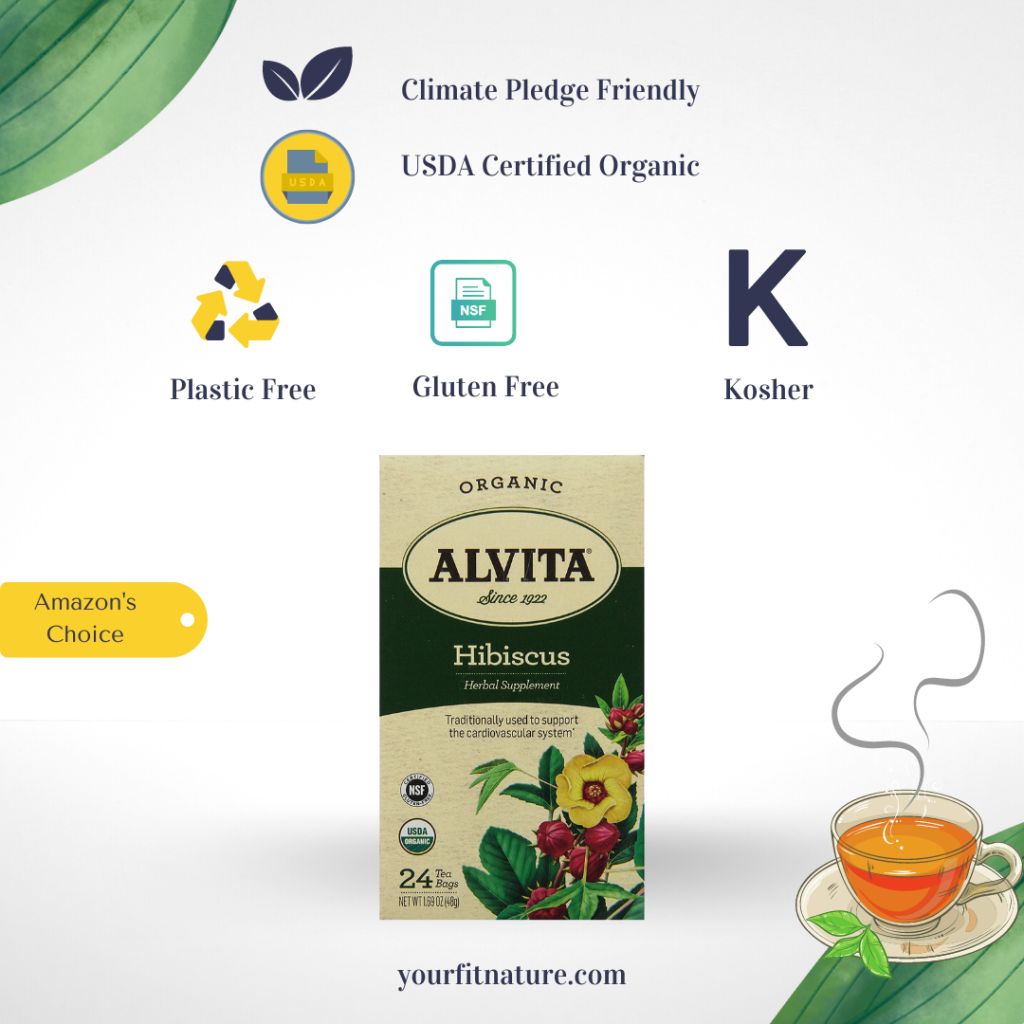7 Natural Herbal Tea: The Science Of Tea’s Health-Altering Magic
Natural herbal tea, infused with herbs, spices, and plants in hot water, has been a popular beverage for centuries due to its relaxing and stress relief.

Drink tea and be merry
Natural herbal tea has been a part of human civilization for centuries ✅. It is a beverage that is made from various herbs, spices, and plants that are infused in hot water. The popularity of natural herbal tea has grown significantly in recent years, as people are becoming more health-conscious and are looking for natural remedies to unwind and de-stress after a long day.
7 Best Natural Herbal Tea & FAQs:
Potential Health Benefits of Drinking Natural Herbal Tea
Natural herbal teas are different from other types of tea as they do not contain caffeine. They are also delicious and simple to consume. Typically, herbal teas are made from either one primary herbal ingredient or a combination of them, with the aim of achieving a specific goal, such as relaxation, revitalization, or alleviating a particular ailment ✅.
Boosts Immune System
Polyphenols like theaflavins, catechins, and thearubigins are abundant in herbal tea and possess biochemical and pharmacological properties.
Natural herbal tea polyphenols have antioxidant properties that help to boost the immune system by neutralizing free radicals in the body, which can cause damage to cells and tissues ✅✅.
Drinking tea that has been fortified with Ayurvedic herbs on a regular basis can boost the activity of NK cells, which play a crucial role in the early innate immune response to infections ✅.
The infusion of tea contains polyphenols, alkaloids, and micronutrients that possess immunomodulatory properties. It can serve as a means of nutritional immunity to alleviate the impact of the COVID-19 outbreak ✅.
Reduces Stress and Anxiety
The calming properties of certain natural herbal teas, such as peppermint leaf and lemon balm leaf, were used to help alleviate stress and anxiety in a group of 20 students attending a medical university ✅ .
The consumption of natural herbal tea can contribute to better sleep quality as it leads to a notable decrease in various evaluation parameters including anxiety, insomnia, inattention, and memory deficiency.
Elders can experience improved brain function by consuming oriental natural herbal tea. The experimental group showed a significant increase in attention quotient (AQ), anti-stress quotient (ASQ), emotion quotient (EQ), and brain quotient (BQ) compared to the control group ✅.
The consumption of tea can reduce the amount of cortisol, which is a hormone associated with stress. Drinking at least 100 milliliters (about half a cup) of green tea a day reduces the likelihood of experiencing depression and dementia. ✅.
Promotes Digestive Health
The major component of green tea is catechins, which are polyphenolic compounds that make green tea effective in reducing the absorption of cholesterol and lipids in the gastrointestinal tract ✅.
The combination of Lactobacillus plantarum and tea powder can enhance the proliferation of advantageous bacteria in the gut and mitigate inflammation ✅.
Tea herbs work by relaxing the muscles in the digestive tract and reducing inflammation, which can help alleviate symptoms of digestive disorders such as bloating, gas, and constipation ✅.

Lowers Blood Pressure
Incorporating hibiscus tea (tisane) into one's daily diet could prove to be a beneficial dietary adjustment for individuals experiencing prehypertension or mild hypertension ✅.
Drinking black tea can reduce blood pressure and wave reflections, especially in hypertensive individuals who consume it while fasting or after eating a high-fat meal ✅.
In a certain study, it was found that consuming tea for an extended period led to a decrease in systolic and diastolic blood pressure by 1.8 and 1.4 mmHg, respectively ✅.
Supports Weight Loss
The polyphenols found in natural herbal tea have the ability to aid in weight loss by inhibiting enzymes responsible for digesting carbohydrates and causing the undigested carbohydrates to interact with gut microbiota ✅.
The effectiveness of a particular tea in promoting weight loss is dependent on the production of short-chain fatty acids (SCFAs) resulting from the interaction between tea polyphenols, remaining carbohydrates, and gut microbiota.
Herbal remedies have the potential to aid in weight loss, with an average difference of -1.17 kg compared to a placebo, although further evidence is required ✅.
Common Types of Natural Herbal Tea
There are various types of natural herbal tea available, each with its unique flavor and health benefits. Some of the most common types of herbal tea include Chamomile, Peppermint, Ginger, Rooibos, Hibiscus, Lemon Balm, and Green Tea.
These teas are made from different parts of plants, including leaves, flowers, roots, and bark. They are also available in different forms, including loose leaves, tea bags, and powders.
1. Chamomile Tea
Reduction in muscle spasms and menstrual pain, as well as decreased stress levels, resulting in improved relaxation and sleep.
- Has anti-inflammatory and antiseptic properties ✅.
- Acts as an antispasmodic and mildly sudorific ✅.
- Chamomile tea contains a compound called 4-O-methyl-glucuronoxylan (SN-50R), which has been associated with antinociceptive, sedative, and anxiolytic-like effects ✅.
- The consumption of chamomile tea has been found to reduce anxiety and depression in cancer patients undergoing chemotherapy ✅.
- Reducing tender joints and inflammation in patients with rheumatoid arthritis ✅.
- It has been shown to be effective in treating symptoms of premenstrual syndrome (PMS) due to its anti-inflammatory, anti-spasmodic, and anti-anxiety effects ✅.
- Aid in glycemic control and improve blood lipid profiles in depressed patients with type 2 diabetes ✅.

Andrew Lessman Egyptian Golden Chamomile Tea
Best Features:
- Sourced from Egypt, known for its high-quality chamomile
- Calming and soothing effects
Reasons to Buy:
- Unique Egyptian chamomile flavor
- Supports relaxation and restful sleep
Traditional Medicinals Organic Chamomile Herbal Leaf Tea
Best Features:
- Certified organic and non-GMO
- Supports relaxation and restful sleep
Reasons to Buy:
- Trustworthy organic certification
- Promotes overall well-being

2. Peppermint Tea
Contains menthol, which has a soothing effect on upset stomachs and can cure ailments such as irritable bowel syndrome (IBS) ✅, constipation, and motion sickness✅. Additionally, it provides relief from pain caused by migraines and tension headaches.
- Has antimicrobial, antioxidant, anti-viral, anti-bacterial, anti-inflammatory, anti-fungal, anti-asthmatic, allopathic, spasmolytic, anti-headache, anti-septic, and radioactive properties ✅.
- Tea bag products are an effective source of polyphenols that may offer health benefits relating to their constituent antioxidant activity ✅.
- Preventing the Interaction between Covid-19 and the Host body ✅

FGO Organic Peppermint Tea
Best Features:
- 100% organic and non-GMO
- Refreshing and invigorating flavor
Reasons to Buy:
- High-quality organic ingredients
- Energizing and uplifting effects
Heather's Tummy Organic Peppermint Tea
Best Features:
- Formulated specifically for digestive support
- High volatile oil content for maximum potency
Reasons to Buy:
- Targets digestive issues effectively
- Premium quality for optimal benefits

3. Ginger Tea
Alleviate morning sickness, chronic indigestion, and joint pain.
- Contains a variety of bioactive components, such as 6-gingerol, 8-gingerol, 10-gingerol, 6-shogaol, 6-hydroshogaol, and oleoresin, which can aid in reducing or slowing down the development of diseases like cancer, diabetes, and obesity ✅.
- Reducing levels of inflammatory biomarkers such as C-reactive protein (CRP), interleukin-6 (IL-6), and tumor necrosis factor (TNF-α). Additionally, it increases total antioxidant capacity (TAC) levels ✅.
- Provides its advantageous outcomes by means of transcription factors such as peroxisome proliferator-activated receptors, adenosine monophosphate-activated protein kinase, and nuclear factor κB. This implies that ginger may have potential applications in personalized nutrition and medicine for managing and preventing metabolic syndromes ✅.
- Promoting healthy aging, reducing morbidity, and potentially prolonging a healthy lifespan ✅.

FGO Organic Ginger Tea
Best Features:
- 100% organic and non-GMO
- Supports digestion and immune health
Reasons to Buy:
- High-quality organic ginger
- Promotes overall wellness
4. Rooibos Tea
Improving blood flow and regulating blood pressure, reducing levels of both harmful and beneficial cholesterol, can aid in maintaining strong hair and promoting healthy skin.
- Both red and green rooibos contain 187 phenolic compounds, which contribute to the antioxidant capacity of Rooibos tea ✅.
- Rooibos tea consumption benefits the lipid and redox profiles of individuals at risk of cardiovascular disease ✅.
- Maintaining healthy blood sugar levels, and improving bone, liver, cognitive, and respiratory health ✅.
- Inhibiting osteoclast formation and activity, which can be beneficial for bone health ✅.
- Modulating immune system actions by influencing the regulation of cytokines and nitric oxide ✅.

Organic Positively Tea Company, South African Rooibos Tea
Best Features:
- Sustainably sourced from South Africa
- Rich in antioxidants and minerals
Reasons to Buy:
- Unique South African flavor profile
- Boosts overall health with antioxidant properties
Cederberg Tea Company Rooibos Herbal Tea
Best Features:
- Ethically harvested from the Cederberg region of South Africa
- Naturally caffeine-free and low in tannins
Reasons to Buy:
- Supports sustainable and ethical practices
- Gentle on the stomach and suitable for all ages

5. Hibiscus Tea
Lowering the amount of fat and blood pressure in your body, suppressing the urge for unhealthy sweets, improving the health of your liver, and avoiding the formation of kidney stones.
- Drinking 2-3 cups of hibiscus tea daily may improve blood pressure and potentially serve as a preventative or adjunctive therapy against cardiovascular disease ✅.
- Containing bioactive compounds such as flavonoids, tannins, terpenoids, saponins, and alkaloids, which contribute to its medicinal effects ✅.
- Has favorable effects on lipid profiles, insulin resistance, oxidative stress, and inflammation ✅.
- Control diabetes and hypercholesterolemia without causing acute toxicity ✅.
- Lowering both systolic and diastolic blood pressure in prehypertensive and mildly hypertensive adults ✅.
- Various medicinal uses, including treating wounds, inflammation, fever and coughs, diabetes, infections caused by bacteria and fungi, hair loss, and gastric ulcers ✅.
Alvita Organic Hibiscus Herbal Tea
Best Features:
- Certified organic and kosher
- Rich in vitamin C and antioxidants
Reasons to Buy:
- Trustworthy certifications for quality assurance
- Supports overall wellness with vitamin C and antioxidants


Traditional Medicinals Organic Hibiscus Herbal Tea
Best Features:
- Certified organic and non-GMO
- Supports cardiovascular health
Reasons to Buy:
- High-quality organic ingredients for maximum benefits
- Promotes heart health
6. Lemon Balm Tea
Enhancing relaxation, minimizing anxiety and stress, and enhancing the quality of sleep. Additionally, it may have a positive impact on cognitive abilities and alleviate symptoms of depression.
- Treatment of various conditions such as sleep disorders, neurodegenerative diseases, obesity, ophthalmology, gynecology, oncology, gastroenterology, and cardiology ✅.
- For the best infusion, sage herbal tea is recommended to be brewed for 5 minutes, while lemon balm herbal tea is recommended to be brewed for 10 minutes ✅.
- Lemon balm-containing foods, such as beverages and yogurt, have been associated with improvements in mood and cognitive performance ✅.
- Enhancing acute settings for the treatment of anxiety and depression symptoms ✅.
- Experiencing improvements in arterial stiffness reduction, skin elasticity enhancement, and specific enhancements in brachial-ankle pulse wave velocity and skin color values is possible for healthy adults ✅.
- Preventing or treating type 2 diabetes and associated disorders such as dyslipidemia and hypercholesterolemia in mice ✅.

Buddha Teas Organic Lemon Balm
Best Features:
- 100% organic and non-GMO
- Calming and soothing effects
Reasons to Buy:
- Trustworthy organic certification
- Supports relaxation and stress relief
7. Green Tea
Promoting weight loss, improving brain function, and reducing the risk of chronic diseases, including heart disease and cancer. Green tea is also believed to have antioxidant properties and may help to improve dental health.
- Contains catechins, with EGCG being the most abundant, which reduces the risk of cardiovascular diseases✅.
- It has anticarcinogenic, anti-inflammatory, antimicrobial, and antioxidant properties✅.
- Lowering inflammation, preventing bone resorption, and inhibiting the growth of certain bacteria related to periodontal diseases✅.
- Reducing chronic conditions such as cardiovascular disease, cancer, Alzheimer's disease, Parkinson's disease, and diabetes ✅.
- Protecting against oxidative stress and contributing to overall health ✅.
- Benefits for weight loss, making it a suitable addition to a healthy diet and lifestyle ✅.
- Increasing collagen and elastin fiber content and suppressing the production of collagen-degrading enzymes ✅.
- Stress resistance and neuroprotective properties have the potential to mediate neurodegenerative diseases ✅.
Imozai Organic Green Tea
Best Features:
- Certified organic and sustainably sourced
- Rich in antioxidants for overall health support
Reasons to Buy:
- High-quality green tea leaves for optimal benefits
- Promotes overall wellness with antioxidant properties

Possible Risks and Side Effects of Natural Herbal Tea
Allergic Reactions
Some people may have an allergic reaction to certain herbs used in natural herbal tea ✅. Symptoms of an allergic reaction may include itching, hives, swelling of the face, tongue, or throat, difficulty breathing, and even anaphylaxis. If you experience any of these symptoms after drinking natural herbal tea, seek medical attention immediately.
Interactions with Medications
Natural herbal tea may interact with medications you are currently taking, which can cause adverse effects. For example, natural herbal tea may increase the effects of blood-thinning medications, such as warfarin, leading to bleeding problems ✅✅. It may also interact with medications used to treat high blood pressure, diabetes, and depression.
Toxicity
Some herbs used in natural herbal tea may be toxic if consumed in large amounts. For example, comfrey tea can cause liver damage ✅✅, and pennyroyal tea can cause kidney and liver damage, seizures, and even death ✅.
Digestive Problems
Some herbs used in natural herbal tea may cause digestive problems, such as stomach upset, diarrhea, and nausea ✅. These side effects are usually mild and go away on their own
How to Minimize Risks While Drinking Natural Herbal Tea
Consult Your Healthcare Provider
Before drinking natural herbal tea, consult your healthcare provider, especially if you have any medical conditions or are taking any medications. Your healthcare provider can help you determine which herbs are safe for you and which ones to avoid.
Read the Labels
Read the labels of natural herbal tea carefully, and make sure you are familiar with the herbs used in the tea. If you are unsure about any of the ingredients, do some research or ask your healthcare provider.
Use High-Quality Herbs
Use high-quality herbs to make your natural herbal tea. Avoid using herbs that have been exposed to pesticides or other chemicals, as these can be harmful to your health.
Don't Drink Too Much
Don't drink too much natural herbal tea, as this can increase the risk of side effects. Stick to the recommended dose, and don't drink more than two to three cups of natural herbal tea per day.
A 51-year-old woman had headaches, nausea, and vomiting for 6 weeks after drinking herbal tea with liquorice root for 3 months, consuming an average of 60g per serving ✅.
For healthy individuals, it is recommended to consume both green tea and natural herbal tea in moderation ✅.
When to Avoid Drinking Natural Herbal Tea
Pregnancy and Breastfeeding
Some herbs used in natural herbal tea may be harmful to pregnant and breastfeeding women ✅.
Chamomile tea may increase the risk of miscarriage ✅.
Consuming ginger in doses higher than 1000 mg per day can lead to thinning of blood, heartburn, and stomach discomfort✅.
There is a lack of knowledge about the phytochemical properties and adequate use of herbal medicines and supplements among pregnant women ✅.
Consult your healthcare provider before drinking natural herbal tea.
Children
Due to differences in physiology and immature metabolic enzyme systems, infants and children may be particularly vulnerable to the adverse effects and toxicity of herbal medicines ✅.
Although herbal medicines may have advantages, there is insufficient evidence-based data on their effectiveness and safety ✅.
Medical Conditions
If you have any medical conditions, such as liver disease, kidney disease, or heart disease, consult your healthcare provider before drinking herbal tea. Some herbs may worsen your condition or interact with your medications ✅.
Frequently Asked Questions
What are some benefits of drinking natural herbal tea?
What are some popular types of natural herbal tea?
Are there any potential side effects of drinking natural herbal tea?
What is natural herbal tea?
References
Fitnature uses only high-quality sources, including peer-reviewed studies, to support the facts within our articles. Read our editorial process to learn more about how we fact-check and keep our content accurate, reliable, and trustworthy.
- Ashwinee Ravindra Savale, and Indrakumar Keval Sonavne -. “The Review on Medicinal Uses of Hibiscus Flower.” International Journal For Multidisciplinary Research, vol. 4, no. 5, Oct. 2022, https://doi.org/10.36948/ijfmr.2022.v04i05.908.
- Aglawe, Sachin, et al. “Chamomile: A Review.” Research Journal of Pharmacology and Pharmacodynamics, vol. 12, 2020, pp. 12–14.
- Anh, Nguyen Hoang, et al. “Ginger on Human Health: A Comprehensive Systematic Review of 109 Randomized Controlled Trials.” Nutrients, vol. 12, no. 1, Jan. 2020, p. 157, https://doi.org/10.3390/nu12010157.
- Aoshima, H., et al. “Antioxidative and Anti-Hydrogen Peroxide Activities of Various Herbal Teas.” Food Chemistry, vol. 103, no. 2, Jan. 2007, pp. 617–22, https://doi.org/10.1016/j.foodchem.2006.08.032.
- Askari, Gholamreza, et al. “The Effects of Ginger Supplementation on Biomarkers of Inflammation and Oxidative Stress in Adults: A Systematic Review and Meta-Analysis of Randomized Controlled Trials.” Journal of Herbal Medicine, vol. 22, Aug. 2020, p. 100364, https://doi.org/10.1016/j.hermed.2020.100364.
- Australian Pharmaceutical Formulary and Handbook: The Everyday Guide to Pharmacy Practice. 2012.
- Axling, Ulrika, et al. “Green Tea Powder and Lactobacillus Plantarum Affect Gut Microbiota, Lipid Metabolism and Inflammation in High-Fat Fed C57BL/6J Mice.” Nutrition & Metabolism, vol. 9, no. 1, Nov. 2012, p. 105, https://doi.org/10.1186/1743-7075-9-105.
- Bakerink, et al. “Multiple Organ Failure After Ingestion of Pennyroyal Oil From Herbal Tea in Two Infants.” Pediatrics, vol. 98, no. 5, Nov. 1996, pp. 944–47, https://doi.org/10.1542/peds.98.5.944.
- Bhat, Jyoti, et al. “In Vivo Enhancement of Natural Killer Cell Activity through Tea Fortified with Ayurvedic Herbs – PubMed.” Phytotherapy Research : PTR, vol. 24, no. 1, Jan. 2010, https://doi.org/10.1002/ptr.2889.
- Bruno, Luciana O., et al. “Pregnancy and Herbal Medicines: An Unnecessary Risk for Women’s Health—A Narrative Review.” Phytotherapy Research, vol. 32, no. 5, pp. 796–810, https://doi.org/10.1002/ptr.6020. Accessed 30 May 2023.
- Builders, Philip. Herbal Medicine. BoD – Books on Demand, 2019.
- Chakraborty, Kousani, et al. “Bioactive Components of Peppermint (Mentha Piperita L.), Their Pharmacological and Ameliorative Potential and Ethnomedicinal Benefits: A Review.” Journal of Pharmacognosy and Phytochemistry, vol. 11, no. 1, Jan. 2022, pp. 109–14, https://doi.org/10.22271/phyto.2022.v11.i1b.14322.
- Chandrasekara, Anoma, and Fereidoon Shahidi. “Herbal Beverages: Bioactive Compounds and Their Role in Disease Risk Reduction – A Review.” Journal of Traditional and Complementary Medicine, vol. 8, no. 4, Aug. 2018, pp. 451–58, https://doi.org/10.1016/j.jtcme.2017.08.006.
- Chaves, Pedro Felipe Pereira, et al. “Chamomile Tea: Source of a Glucuronoxylan with Antinociceptive, Sedative and Anxiolytic-like Effects – PubMed.” International Journal of Biological Macromolecules, vol. 164, Dec. 2020, https://doi.org/10.1016/j.ijbiomac.2020.08.039.
- Chowdhury, Pritom, and Anoop Kumar Barooah. “Tea Bioactive Modulate Innate Immunity: In Perception to COVID-19 Pandemic.” Frontiers in Immunology, vol. 11, Oct. 2020, p. 590716, https://doi.org/10.3389/fimmu.2020.590716.
- Cj, Etheridge, and Derbyshire Ej. “Hibiscus Tea and Health: A Scoping Review of Scientific Evidence.” Nutrition and Food Technology: Open Access, vol. 6, no. 1, 2020, https://doi.org/10.16966/2470-6086.167.
- Cleverdon, Riley, et al. “Total Polyphenol Content and Antioxidant Capacity of Tea Bags: Comparison of Black, Green, Red Rooibos, Chamomile and Peppermint over Different Steep Times.” Beverages, vol. 4, no. 1, Feb. 2018, https://doi.org/10.3390/beverages4010015.
- Dai, Yun-Lei, et al. “Chamomile: A Review of Its Traditional Uses, Chemical Constituents, Pharmacological Activities and Quality Control Studies.” Molecules (Basel, Switzerland), vol. 28, no. 1, Dec. 2022, p. 133, https://doi.org/10.3390/molecules28010133.
- Damiani, Elisabetta, et al. “Impact of Cold versus Hot Brewing on the Phenolic Profile and Antioxidant Capacity of Rooibos (Aspalathus Linearis) Herbal Tea.” Antioxidants (Basel, Switzerland), vol. 8, no. 10, Oct. 2019, p. 499, https://doi.org/10.3390/antiox8100499.
- Ghamchini, Vahid Moeini, et al. “The Effect of Chamomile Tea on Anxiety and Depression in Cancer Patients Treated with Chemotherapy.” Journal of Young Pharmacists, vol. 11, no. 3, Aug. 2019, pp. 309–12, https://doi.org/10.5530/jyp.2019.11.62.
- Ghazizadeh, Javid, et al. “The Effects of Lemon Balm (Melissa Officinalis L.) on Depression and Anxiety in Clinical Trials: A Systematic Review and Meta-Analysis – PubMed.” Phytotherapy Research : PTR, vol. 35, no. 12, Dec. 2021, https://doi.org/10.1002/ptr.7252.
- Gilbert, Natasha. “The Science of Tea’s Mood-Altering Magic.” Nature, 6 Feb. 2019, https://www.nature.com/articles/d41586-019-00398-1. Accessed 29 May 2023.
- Grassi, Davide, et al. “Black Tea Lowers Blood Pressure and Wave Reflections in Fasted and Postprandial Conditions in Hypertensive Patients: A Randomised Study.” Nutrients, vol. 7, no. 2, Feb. 2015, pp. 1037–51, https://doi.org/10.3390/nu7021037.
- Grigoriev, P. E., et al. “Psychological Effects of the Course Reception of Multicomponent Herbal Blend “Antistress.” Plant Biology and Horticulture: Theory, Innovation, no. 160, Nov. 2021, pp. 96–103, https://doi.org/10.36305/2712-7788-2021-3-160-96-103.
- Guo, Yu-Jie, et al. “An Integrated Antioxidant Activity Fingerprint for Commercial Teas Based on Their Capacities to Scavenge Reactive Oxygen Species – PubMed.” Food Chemistry, vol. 237, Dec. 2017, https://doi.org/10.1016/j.foodchem.2017.05.024.
- Hoosen, Mujeeb. “The Effects of Aspalathus Linearis (Rooibos Tea) on Nitric Oxide (NO) and Cytokine Activity.” International Journal of Human and Health Sciences (IJHHS), vol. 3, no. 3, May 2019, p. 150, https://doi.org/10.31344/ijhhs.v3i3.93.
- K Chowdhury. Health Benefits of Green Tea and Herbal Teas: A Comparative Review. 2020.
- K. Soni, Moina Sharma, Sushil Singh. “MEDICINAL PROPERTIES OF TEA IN RELATION TO BOOSTING IMMUNE SYSTEM – A REVIEW.” Epidemiology Department, National Institute for Research in Environmental Health, Indian Council of Medical Research, Bhopal, vol. 11, no. 05, May 2020.
- Katarzyna Świąder, et al. The Therapeutic Properties of Lemon Balm ( Melissa Officinalis L.): Reviewing Novel Findings and Medical Indications. 2019.
- Khalesi, Zahra Bostani, et al. “Efficacy of Chamomile in the Treatment of Premenstrual Syndrome: A Systematic Review.” Journal of Pharmacopuncture, vol. 22, no. 4, Dec. 2019, pp. 204–09, https://doi.org/10.3831/KPI.2019.22.028.
- Koo, Marcel W. L., and Chi H. Cho. “Pharmacological Effects of Green Tea on the Gastrointestinal System – PubMed.” European Journal of Pharmacology, vol. 500, no. 1–3, Oct. 2004, https://doi.org/10.1016/j.ejphar.2004.07.023.
- Liu, Gang, et al. “Effects of Tea Intake on Blood Pressure: A Meta-Analysis of Randomised Controlled Trials – PubMed.” The British Journal of Nutrition, vol. 112, no. 7, Oct. 2014, https://doi.org/10.1017/S0007114514001731.
- Ma, Run-Hui, et al. “A Recent Update on the Multifaceted Health Benefits Associated with Ginger and Its Bioactive Components – PubMed.” Food & Function, vol. 12, no. 2, Jan. 2021, https://doi.org/10.1039/d0fo02834g.
- Maunder, Alison, et al. “Effectiveness of Herbal Medicines for Weight Loss: A Systematic Review and Meta‐analysis of Randomized Controlled Trials.” Diabetes, Obesity and Metabolism, vol. 22, no. 6, pp. 891–903, https://doi.org/10.1111/dom.13973. Accessed 29 May 2023.
- McKay, Diane L., et al. “Hibiscus Sabdariffa L. Tea (Tisane) Lowers Blood Pressure in Prehypertensive and Mildly Hypertensive Adults.” The Journal of Nutrition, vol. 140, no. 2, Feb. 2010, pp. 298–303, https://doi.org/10.3945/jn.109.115097.
- Mei, Nan, et al. “Analysis of Gene Expression Changes in Relation to Toxicity and Tumorigenesis in the Livers of Big Blue Transgenic Rats Fed Comfrey (Symphytum Officinale).” BMC Bioinformatics, vol. 7, no. 2, Sept. 2006, pp. 1–15, https://doi.org/10.1186/1471-2105-7-S2-S16.
- Moosa, Shaakirah, et al. “Rooibos Tea Extracts Inhibit Osteoclast Formation and Activity through the Attenuation of NF-κB Activity in RAW264.7 Murine Macrophages – PubMed.” Food & Function, vol. 9, no. 6, June 2018, https://doi.org/10.1039/c7fo01497j.
- Nayak, Parv, et al. “Peppermint a Medicinal Herb and Treasure of Health: A Review.” Phytopathology, vol. 9, 2020, pp. 1519–28.
- Pandher, Ravind, et al. “The Dangers of Herbal Teas: Hypertension and Weakness Caused by Liquorice‐induced Apparent Mineralocorticoid Excess.” Medical Journal of Australia, vol. 213, no. 5, pp. 207-208.e1, https://doi.org/10.5694/mja2.50728. Accessed 30 May 2023.
- Pirouzpanah, Saeed, et al. “The Effect of Chamomile Tea Consumption on Inflammation among Rheumatoid Arthritis Patients: Randomized Clinical Trial.” Progress in Nutrition, vol. 19, 2017, pp. 27–33.
- Prasanth, Mani Iyer, et al. “A Review of the Role of Green Tea (Camellia Sinensis) in Antiphotoaging, Stress Resistance, Neuroprotection, and Autophagy.” Nutrients, vol. 11, no. 2, Feb. 2019, p. 474, https://doi.org/10.3390/nu11020474.
- Pregnancy and Breastfeeding Medicines Guide. 2013.
- Reygaert, Wanda C. “An Update on the Health Benefits of Green Tea.” Beverages, vol. 3, no. 1, Jan. 2017, https://doi.org/10.3390/beverages3010006.
- Rothenberg, Dylan O’Neill, et al. “A Review on the Weight-Loss Effects of Oxidized Tea Polyphenols.” Molecules (Basel, Switzerland), vol. 23, no. 5, May 2018, p. 1176, https://doi.org/10.3390/molecules23051176.
- Rouhi-Boroujeni, Hamid, et al. “Systematic Review on Safety and Drug Interaction of Herbal Therapy in Hyperlipidemia: A Guide for Internist – PubMed.” Acta Bio-Medica : Atenei Parmensis, vol. 86, no. 2, Sept. 2015.
- Sanadheera, Subhashinie, et al. “Hibiscus Rosa-Sinensis L. (Red Hibiscus) Tea, Can It Be Used as A Home-Remedy to Control Diabetes and Hypercholesterolemia?” Biology, Medicine, & Natural Product Chemistry, vol. 10, no. 1, July 2021, pp. 59–65, https://doi.org/10.14421/biomedich.2021.101.59-65.
- Scholey, Andrew, et al. “Anti-Stress Effects of Lemon Balm-Containing Foods.” Nutrients, vol. 6, no. 11, Oct. 2014, pp. 4805–21, https://doi.org/10.3390/nu6114805.
- “Tea (Beverage) – an Overview.” ScienceDirect Topics, https://www.sciencedirect.com/topics/food-science/tea-beverage.
- Tj, Bond, and Derbyshire Ej. “Rooibos Tea and Health: A Systematic Review of the Evidence from the Last Two Decades.” Nutrition and Food Technology: Open Access, vol. 6, no. 1, 2020, https://doi.org/10.16966/2470-6086.166.
- Tomassoni, Anthony J., and Karen Simone. “Herbal Medicines for Children: An Illusion of Safety?” Current Opinion in Pediatrics, vol. 13, no. 2, Apr. 2001, pp. 162–69, https://doi.org/10.1097/00008480-200104000-00014.
- Vyas, Tarun, et al. “Therapeutic Effects of Green Tea as an Antioxidant on Oral Health- A Review.” Journal of Family Medicine and Primary Care, vol. 10, no. 11, Nov. 2021, pp. 3998–4001, https://doi.org/10.4103/jfmpc.jfmpc_943_21.
- Wang, Jing, et al. “Beneficial Effects of Ginger Zingiber Officinale Roscoe on Obesity and Metabolic Syndrome: A Review – PubMed.” Annals of the New York Academy of Sciences, vol. 1398, no. 1, June 2017, https://doi.org/10.1111/nyas.13375.
- Weidner, Christopher, et al. “Lemon Balm Extract Causes Potent Antihyperglycemic and Antihyperlipidemic Effects in Insulin-Resistant Obese Mice – PubMed.” Molecular Nutrition & Food Research, vol. 58, no. 4, Apr. 2014, https://doi.org/10.1002/mnfr.201300477.
- Wilkinson, J. M. “What Do We Know about Herbal Morning Sickness Treatments? A Literature Survey – PubMed.” Midwifery, vol. 16, no. 3, Sept. 2000, https://doi.org/10.1054/midw.1999.0209.
- Xing, Lujuan, et al. “Recent Advances in the Understanding of the Health Benefits and Molecular Mechanisms Associated with Green Tea Polyphenols – PubMed.” Journal of Agricultural and Food Chemistry, vol. 67, no. 4, Jan. 2019, https://doi.org/10.1021/acs.jafc.8b06146.
- Yaman, Cennet. “Lemon Balm and Sage Herbal Teas: Quantity and Infusion Time on the Benefit of the Content.” Ciência e Agrotecnologia, vol. 44, 2020, https://doi.org/10.1590/1413-7054202044023220.
- YEONG, MEE LING, et al. “Hepatic Veno‐occlusive Disease Associated with Comfrey Ingestion.” Journal of Gastroenterology and Hepatology, vol. 5, no. 2, pp. 211–14, https://doi.org/10.1111/j.1440-1746.1990.tb01827.x. Accessed 30 May 2023.
- Youn, Mee Kyung, et al. “The Effects of Oriental Herbal Tea on the Brain Function Quotient of Elders at Health Facility.” Journal of East-West Nursing Research, vol. 19, no. 2, Nov. 2013, pp. 128–37, https://doi.org/10.14370/jewnr.2013.19.2.128.
- Yui, Shintaro, et al. “Beneficial Effects of Lemon Balm Leaf Extract on In Vitro Glycation of Proteins, Arterial Stiffness, and Skin Elasticity in Healthy Adults – PubMed.” Journal of Nutritional Science and Vitaminology, vol. 63, no. 1, Jan. 2017, https://doi.org/10.3177/jnsv.63.59.
Review date not set.
How we reviewed this article:
Latest on:





